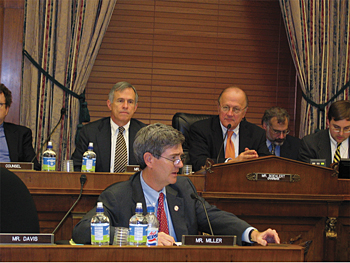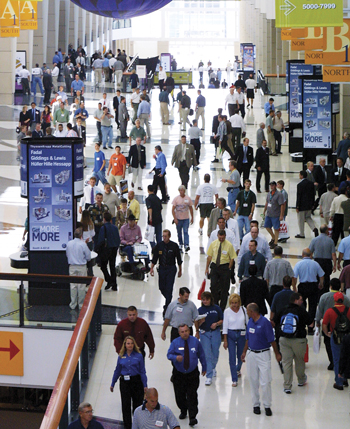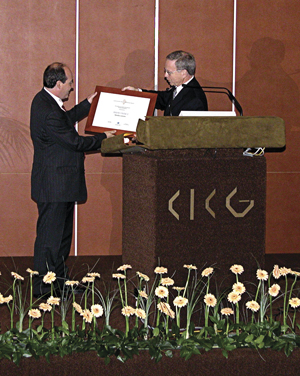 Westchester County Airport Registered to ISO 14001 Westchester County Airport Registered to ISO 14001
Westchester County Airport, located in White Plains, New York, registered to ISO 14001 recently, an achievement that topped off a three-year effort to attain the registration.
“My administration has long been committed to making this airport meet the highest environmental standards,” says County Executive Andy Spano. “This is more than just talk. To become ISO 14001- certified, we worked for three years to develop a system that would measure the environmental activities at the airport…. This prestigious certification means we have set a standard with the breadth and depth of our system.”
The airport’s environmental management system ( EMS) consists of a management structure and procedures that allow the airport to identify, analyze and reduce the environmental impact of all its activities. The scope of the airport’s ISO 14001 registration covers all activities at the airport, a 703-acre facility owned by West-chester county.
Environmental programs at the airport include:
 Protecting Rye Lake and Blind Brook by preventing spills and monitoring stormwater and groundwater quality Protecting Rye Lake and Blind Brook by preventing spills and monitoring stormwater and groundwater quality
 Installing spill and runoff protection filters on storm drains Installing spill and runoff protection filters on storm drains
 Implementing an airportwide spill prevention plan Implementing an airportwide spill prevention plan
 Protecting the airport’s wetlands Protecting the airport’s wetlands
 Remediating historic spill sites Remediating historic spill sites
 Implementing better ways to capture de-icing fluid Implementing better ways to capture de-icing fluid
 Improving the airport recycling program Improving the airport recycling program
 Monitoring compliance with the airport voluntary restraint-from-flying program Monitoring compliance with the airport voluntary restraint-from-flying program
 Improving noise monitoring and noise reduction programs Improving noise monitoring and noise reduction programs
 Implementing a material management plan Implementing a material management plan
 Ensuring the proper disposal of wastes Ensuring the proper disposal of wastes
The ISO 14001 designation is the second significant development for the airport in recent weeks. Just a few days before the airport announced it had registered to ISO 14001, Spano signed a law that codifies restrictions on the number of commercial flights at the airport. The airport is located in an environmentally sensitive area adjacent to the Kensico Reservoir.
According to the Westchester County Airport, it is the third U.S. airport to register to ISO 14001.
“The fact that Westchester Airport is one of a handful of airports certified to ISO 14001 demonstrates the county’s concern for the environment,” says James Melloni, lead auditor for TÜV America, which issued the airport’s registration. “Not only did they involve airport employees, they also involved airport tenants, federal TSA employees, the police and county government in the process.”
For more information, visit www.westchestergov.com.
Customer Satisfaction Holds Steady in Second Quarter
The latest American Customer Satisfaction Index held steady for the sec-ond quarter of 2004, remaining at its highest level in 10 years.
The index stands at 74.4 on the 100-point scale. Economists report that the sunny news indicates high customer satisfaction, which generally contributes to increased consumer spending and a healthier economy. Although satisfaction cannot completely offset recent price and interest rate hikes, the economy’s ability to deliver strong satisfaction levels should help bring spending back from its recent dip.
The report, which is produced by a partnership of the University of Michigan Business School, the American Society for Quality and CFI Group, suggests that the U.S. auto industry will have to fight to keep from losing customers to foreign carmakers, and that some domestic PC brands are gaining market share. Industry-level satisfaction scores provide strong cues concerning which lines of business are most vulnerable to competition.
“High levels of satisfaction with shopping and consumption usually mean that people are more willing to spend, which gives a boost to the economy,” says Claes Fornell, head of the ACSI at the University of Michigan. “But there are now considerable forces pulling in the other direction. Price-adjusted satisfaction is actually dropping. Add weak employment, debatable wage growth and higher interest rates to the picture, and enthusiasm for buying weakens. Nevertheless, third-quarter spending is almost certain to be higher than the dismal second-quarter spending.”
While the survey reveals mostly good news for the economy, it also had a word of warning for U.S. automakers. Five of the six auto brand names at or below the industry average for customer satisfaction are domestic companies. The gap in customer satisfaction between domestic and foreign producers is growing once again--with Japan in the lead, followed by European automakers. The report indicates that the growing gap will not make it easier for the traditional Big Three U.S. automakers to curb further erosion of their market share.
“Major recalls not withstanding, the Big Three are basically holding their own with foreign automakers when it comes to quality and reliability,” Fornell says. “Where they fall short is on value. Despite the weakening dollar, domestic automakers have not been able to capitalize in price comparisons with international competition.”
The ACSI had good news for the personal computer market, which has benefited from lower prices, upgrades in power and capabilities, and more experienced users. Those market characteristics bounced the personal computer market to a level last seen in 2000. Apple Computer led the way with a score of 81, showing a 5 percent improvement in each of the last two years. The report also indicates that Gateway has improved in the customer’s eye, from a low score of 69 a year ago to 74 this year.
“A company that improves in customer satisfaction tends to perform better financially by generating more repeat business, which leads to greater profits and higher stock prices,” Fornell says. “Sales of Apple computers are up and its stock value has improved more than 50 percent over the past year.”
But even as Apple and Gateway improve, Hewlett-Packard has dropped on the ACSI. At one time a leader in customer satisfaction, HP dropped below the industry average for the first time a year ago.
“HP remains competitive on price,” says Jack West, past president of the American Society for Quality, a co-sponsor of the ACSI. “But this is a reminder that there’s more to satisfaction and loyalty than meets the eye. HP’s problem is that the quality of both its products and service support has fallen off sharply since the mid-1990s, when HP was leading the industry.”
For more information, visit www.theacsi.org.

Representative Brad Miller
|
Senate Passes Baldrige
Not-For-Profit Bill
Senators unanimously passed H.R. 3389 on Sept. 24, a bill that establishes a not-for-profit category for the Malcolm Baldrige National Quality Award.
“This is great news for the entire country as well as the quality community and the American Society for Quality, which has been the driving force behind the effort to expand the Baldrige to the not-for-profit sector,” says Danny Duhan, ASQ president.
The House of Representatives unanimously passed the bill in March, so it will now be sent to President Bush for his signature.
Supporters lobbied members of Congress for two years to pass the bill. Legislators who worked to pass the bill include Representatives Melissa Hart (R-PA), Brad Miller (D-NC), Sherwood Boehlert (R-NY), Bart Gordon (D-TN) and Vern Ehlers (R-MI), and Senators John McCain (R-AZ) and Ernest Hollings (D-SC).
For more information, visit www.asq.org.
Survey Finds ISO 9001 in Transition and ISO 14001 Growing
2003 was a year of transition for ISO 9001:2000 and a year of significant growth for ISO 14001, reports the International Organization for Standardization in its annual survey.
Study results about ISO 9001:2000 included:
 Up to the end of 2003, at least 500,125 registrations had been issued in 149 countries and economies. Up to the end of 2003, at least 500,125 registrations had been issued in 149 countries and economies.
  2003 total registrations represent an increase of 200 percent over 2002, when the total was 167,210 registrations in 134 countries and economies. 2003 total registrations represent an increase of 200 percent over 2002, when the total was 167,210 registrations in 134 countries and economies.
 The 2003 total represents a tenfold increase over 2001, when the total registrations were 44,388 in 98 countries and economies. The 2003 total represents a tenfold increase over 2001, when the total registrations were 44,388 in 98 countries and economies.
The survey found a dramatic increase in the number of registrations to ISO 14001. Among the findings were:
 Up to the end of 2003, at least 66,070 registrations to ISO 14001 had been issued in 113 countries and economies. Up to the end of 2003, at least 66,070 registrations to ISO 14001 had been issued in 113 countries and economies.
 The number of registrations to ISO 14001 in 2003 increased 34 percent from 2002--the largest increase in the nine annual surveys ISO has performed. The number of registrations to ISO 14001 in 2003 increased 34 percent from 2002--the largest increase in the nine annual surveys ISO has performed.
The survey also found that an increasing number of organizations are opting to register to sector-specific standards--such as ISO/TS 16949, TL 9000 and ISO/TS 29001--instead of the more general ISO 9001:2000.
“Paradoxically, this evolution may actually be increasing the number of ISO 9001:2000-certified organizations because ISO 9001:2000 is incorporated within sector-specific documents that are being cascaded down the global supply chains of important sectors comprising many thousands of supplier companies,” reads the survey.
For more information on ISO standards, visit www.iso.org.
 IMTS 2004 Attendance Figures Increase IMTS 2004 Attendance Figures Increase
Organizers of the 2004 International Manufacturing Technology Show are calling the event a resounding success and are already planning the 2006 show.
“Everything went exactly the way it was supposed to,” says Association for Manufacturing Technology representative Lucy Coburn. “It was a big success.”
A total of 86,232 people registered for the 2004 show, up slightly from 2002, when 85,071 registered. Both figures are significantly lower than 2000’s IMTS, when 114,675 registrations were tallied. Coburn suspects the terrorist attacks on Sept. 11, 2001, along with the slumping economy and generally smaller travel budgets, are at least partially to blame for the smaller attendance figures.
IMTS had its share of high-profile attendees, among them Albert Frink, assistant secretary of commerce for manufacturing and services. He attended the show the day after he was sworn into office in Washington, D.C. Frink, who has a background in carpet manufacturing, was shown around the show by Paul Warndorf, AMT president of technology.
“I’m here to be an advocate for manufacturing,” Frink said at the show. “Manufacturing is not getting the respect it deserves, and that’s a tragedy.”
Two new additions to the show this year--the Emerging Technology Center and the Junkyard Wars exhibit--were big hits, Coburn reports. She’s not sure if they will return for the 2006 show, but she says there has been interest about bringing them back.
Preparations are already underway for the next IMTS, which will be held Sept. 6-13, 2006, at McCormick Place in Chicago.
For more information, visit www.imts.com.

Charles Corrie, subcommittee secretary, accepted the award on behalf of his colleagues.
|
ISO 9001:2000 Developers Honored With Award
The International Organization for Standardization recently awarded the subcommittee responsible for developing ISO 9001:2000 with the prestigious Lawrence D. Eicher Leadership Award.
In presenting the award, ISO President Oliver Smoot praised ISO/TC 176, which developed the standard, for its “rigorous and demanding” project management throughout the development process. Charles Corrie, secretary to the subcommittee, accepted the award for his colleagues.
“On behalf of all of ISO, I am pleased to present the award certificate and offer our congratulations and thanks for the work accomplished efficiently, effectively and harmoniously,” Smoot remarked. He also congratulated the subcommittee “for having one of the highest rates of participation for developed and developing countries, all of whom benefit from the support of an excellent secretariat.”
The British Standards Institution holds the secretariat of the subcommittee, which is chaired by John Davies. There are 68 representatives on ISO/TC 176 (59 participants and nine observers). The recommendation to honor the subcommittee was made by ISO’s Technical Management Board, which received eight nominations from member bodies last April.
The Lawrence D. Eicher Leadership Award was set up in 2002 by ISO to honor the memory of the late Dr. Lawrence D. Eicher, who was ISO’s secretary-general from 1986 to 2002.
For more information, visit www.iso.org. |





